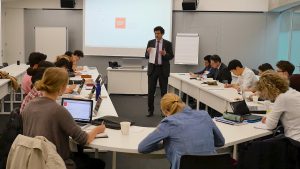
Multiple professors, researchers and students work on SDG 11 at the Graduate Institute. Their work includes academic and policy-oriented publications, events and research projects. We also offer Executive Master degrees in Environmental Governance, and Development Policies and Practices, and an academic Master degree in Development Studies.


The power of location for environmental monitoring and decision making

Nature’s contribution to the 2030 Agenda

Climate Indicators and Sustainable Development: Demonstrating the Interconnections

How Can Energy-Pricing Reforms Be Socially Sustainable?

Gangs Project Public Launch

REPLACING GDP BY 2030: Towards a common language for the well-being and sustainability community

Strange Natures: conservation in the era of synthetic biology

Environmental Governance & Policy-Making

Urban Safety and Peacebuilding: New Perspectives on Sustaining Peace in the City

Understanding the Tipping Point of Urban Conflicts: Violence, Cities, and Poverty Reduction in the Developing World

The Emerging World: alternatives that can change everything
Discover more SDGs
View moreGoal 11 aims to improve urban planning and management which is needed to make the world’s urban spaces more inclusive, safe, resilient and sustainable. The UN Sustainable Development Knowledge Platform stresses that “rapid urbanization has brought enormous challenges, including growing numbers of slum dwellers, increased air pollution, inadequate basic services and infrastructure, and unplanned urban sprawl, which also make cities more vulnerable to disasters”. Read more about Goal 11.